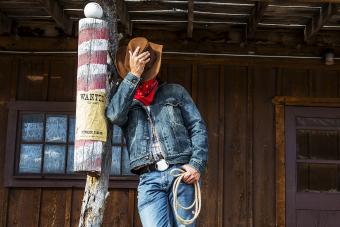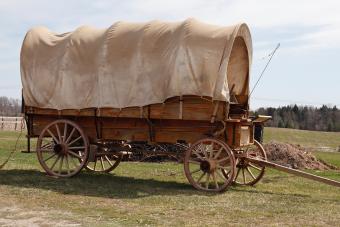
If you're like me, you use a lot of these phrases, so they don't seem so strange. But to people who aren't American, some of these quirky idioms can sound a little odd, especially if they interpret them literally. These are some of the funny idioms we use and where they came from.
Long in the Tooth

Some people have naturally longer chompers than others, but it's usually not an indication of anything other than that's how their teeth grew. But horses are another story. Their teeth continue to grow as they age. That's how "long in the tooth" came to mean something that's aging or getting older.
Spill the Beans

Don't worry — unless you literally do it, no paper towels are required when someone spills the beans. This phrase means to reveal secret or confidential information. As to its origins, the prevailing theory comes from Ancient Greece, where people voted with beans. When someone spilled the beans, they shared the results of the vote before it was time to do so.
Graveyard Shift

If this phrase — which means working the night shift — conjures images of people digging graves after dark, there could be some truth to it if you believe one of the theories about its origins. According to the theory, back in the day when people were afraid of being buried alive, they were often buried with a bell so that if they awoke in this predicament, they could ring it and be set free from their creepy prison. So someone would sit at night near the grave to listen for the bell was working the graveyard shift.
A competing theory suggests the term comes from the maritime world, where sailors sat "graveyard watch" between midnight and 4 AM, a time when a lot of fatal disasters at sea occurred.
Kick the Bucket

In the United States, we often use euphemisms to describe dying — I suppose to soften what's a highly emotional and frightening topic. Kick the bucket is one of many death euphemisms. And while it sounds like a softer term than straight up saying, "died," the two prevailing theories of where kick the bucket comes from are actually more grisly than using that simple, direct, one-syllable word.
The first theory suggests that when someone hangs themselves, they stand on a bucket and kick it away to complete the act. The second theory is that it comes from slaughtering pigs. The beam from which the pigs were once hung was called the bucket, and the pigs would kick as they were suspended.
Spill the Tea

This is a more recent idiom, appearing in the 1990s in AAVE and drag culture. The phrase first appeared as "spill the T" in the book Midnight in the Garden of Good and Evil, and it meant to speak the truth. In the past few decades, the spelling of T (representing truth) has evolved to tea, and it essentially means gossip. So spilling the tea is sharing gossip.
All Hat & No Cattle

The state of Texas gave us this fun phrase to describe someone who is all appearance and no substance or all talk and no action. It comes from people wearing cowboy hats without actually being ranchers.
Piece of Cake

While something that's a "piece of cake" may be super easy to obtain, finding the origins of this phrase is hardly a piece of cake. According to , the earliest instance is found in Ogden Nash's 1936 work, "Primrose Path" with the lines, "Her picture’s in the papers now, And life’s a piece of cake."
And that, it would seem, is that. But unlike the ease implied by the idiom itself, it's impossible to find those two sentences pretty much anywhere, so could this be untrue? Maybe.
Another story suggests the origins come from the enslavement of Black people in the South and involve cake walks. You'll find these as the two predominant theories of this phrase, but the origin, it seems, remains a bit of a mystery.
Beat Around the Bush

No need to be evasive in answering the origins of this idiom, which means failing to get to the point. So we'll get straight to the point. The phrase "beat around the bush" originates from an old hunting practice from the 14th or 15th Centuries, when hunters would beat the bushes to flush out birds, which would fly away to evade capture.
Cold Turkey

Have you ever taken a bite of cold chicken and gotten the hiccups? It happens at our house often enough that we have a name for it: chickups. It's enough to make you want to quit chicken cold turkey.
The phrase cold turkey means giving something up (particularly something addictive) all at once and experiencing unpleasant symptoms. For instance, when I quit caffeine cold turkey, I get headaches for a few days.
According to , the phrase may come from one of the side effects of withdrawal — goosebumps that are similar to cold turkey skin. Or, it could come from two phrases from the early 20th Century — cold, meaning straightforward and talking turkey, meaning speaking plainly.
The Elephant in the Room

Ever failed to notice the elephant in the room? If so, you're avoiding the big, obvious thing that nobody's talking about. Unlike other idioms, this one actually has a very clear origin: an 1814 fable called "The Inquisitive Man" written by Ivan Andreevich Krylov. In the fable, a man goes to a museum and sees all sorts of small things but doesn't notice a giant elephant that's there, too.
Jump on the Bandwagon

When you jump on the bandwagon, you join up with something existing or, as another idiom says, you jump in with both feet. The origins of this phrase come from PT Barnum's circus and 19th Century American politics. In the 1800s, PT Barnum literally had a wagon with a band on it. And politicians would sometimes grab seats on the bandwagon to get out and find supporters. Since then, people have jumped on all sorts of bandwagons. I have been on a literal bandwagon of older band musicians who rode instead of marching. I've also been on many figurative bandwagons throughout my life.
Sign up for our newsletter featuring all the latest stories and products we love.
Break a Leg

Ouch! It's hard to imagine why this idiom is a wish to perform successfully, but it is (although not in dance. In ballet and other forms of dance, wishing that someone would "break a leg" seems rather unlucky, so they wish each other merde instead, which is a French expletive that I'll let you Google so I don't have to add a swear).
So why do people wish performers luck by saying, "break a leg?" In the theater, wishing someone good luck is somehow believed to bring bad luck, but saying something insulting brings good luck (insert confused shrugging emoji here), so performers in England and later the US started saying, "I hope you break a leg." In other words, it's superstition, baby.
Break the Ice

As someone who lives in the temperate Pacific Northwest, physically breaking the ice isn't something I have to do much in my life. But as a socially awkward person, yeah — I have to do it a lot. Usually badly. When you figuratively break the ice, you're getting a conversation started.
Breaking the ice has its origins in maritime history, when small ships would head out to break up ice so that larger ships could flow through easily. Somehow, it took a leap (the first recorded instance of its use is from the 16th Century) to making conversations flow smoothly, and now everyone is looking for the ideal icebreaker.
Let the Cat Out of the Bag

Come closer — I'm about to reveal a secret. That's what let the cat out of the bag means — to reveal hidden information. There are two possible origins for this phrase. One is that in the Royal Navy a long time ago, a whip called the cat o' nine tails was kept in a bag and used as punishment. So when someone told on another person for a transgression, they were letting the cat out of the bag. The second possible origin comes from an old-timey scam called pig in a poke. A customer would purchase a bag that they were told contained a suckling pig, but when they opened it, they discovered a cat, instead.
Wet Blanket

When you call someone a wet blanket, it's not exactly complimentary. It means somebody who sucks all the air out of the room — somebody who kills all the fun and enthusiasm instantly. Which is exactly what a wet blanket (hopefully) does when you throw it on a fire. It douses it instantly, which is where the phrase came from.
We May Not Always Know Why, but We Say It Anyway

When you grow up around American idioms, you usually know what you mean, but that doesn't mean you always know why you say it. And while some of the origins of these uniquely American sayings are a little murky, it's fun to know why we say what we do.







